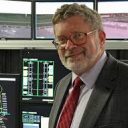 Prof. Dr. Carl-Herbert Rokitansky
Prof. Dr. Carl-Herbert Rokitansky
Professor for “Technical Informatics” at University of Salzburg
Presentation title
Disposition of Trains by means of Decision Support Algorithms adapted from the Aviation Domain
Summary
Currently, trains are manually piloted by the locomotive operator in long-distance and regional traffic. Operators have to accelerate and stop the train and to react in case of any unforeseen situations. In addition to the railway infrastructure, disposition of railway operation is one of the key issues in automated train operation. Replacing current manual disposition by either partial or full automation, even complex tasks could be solved more effectively.
Semi-automated disposition procedures with decision support aim therefore not only at taking the stress off the drivers and dispatchers but also at reducing both secondary delays as well as power consumption. In order to support future automated train operation the goal of the FFG ATO_DispoSim Project (2017 – 2019) is to develop an optimised and practice-related rail arrangement planning by the use of simulation technology. Planned developments are shown on examples from the aviation domain.
Speaker biography
From 1983 to 1991 prof. Rokitansky was with “Institut für Nachrichtentechnik” at DFVLR (former name of DLR) Oberpfaffenhofen (-1988), Visiting Professor at University of Lawrence, KS, USA (1986/78), “Institut für Datenverarbeitungstechnik” at “Fern-Universität” Hagen, Germany (1988-1991). Since 1991 he has worked within the Institute of Communication Networks, RWTH Aachen University of Technology, Aachen, Germany.
He is currently H.-Professor for “Technical Informatics” at University of Salzburg, Institute (FB) for Computer Sciences, where since 1989 he has given lectures on mobile communication, stochastic modelling and simulation, performance analysis using Markov chains, encryption and data security. At the University of Salzburg, Prof. Dr. Rokitansky established (in 2004) the “Aerospace Research” Group which contributed already significantly in the development and performance evaluation of digital aeronautical communication systems and ATM/ATC/CNS concepts.
